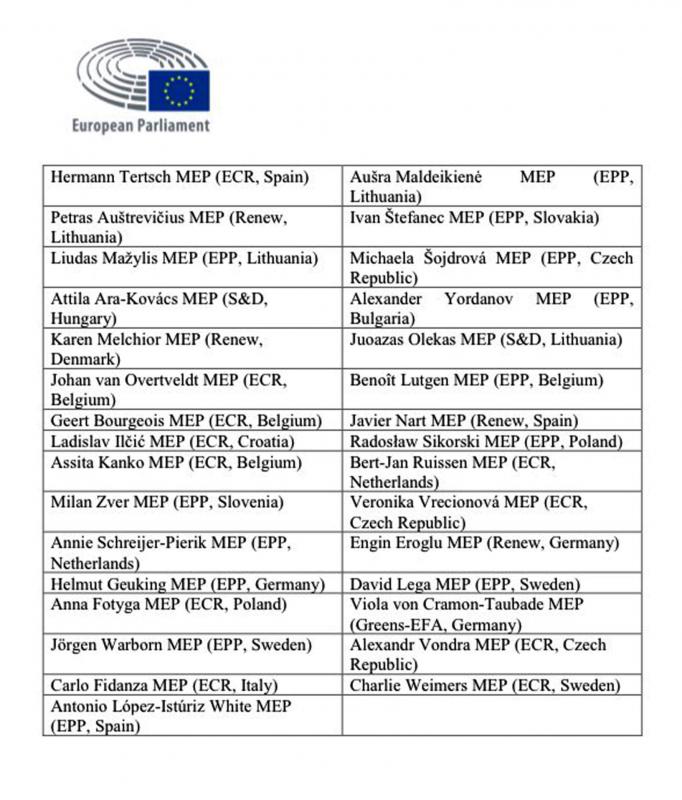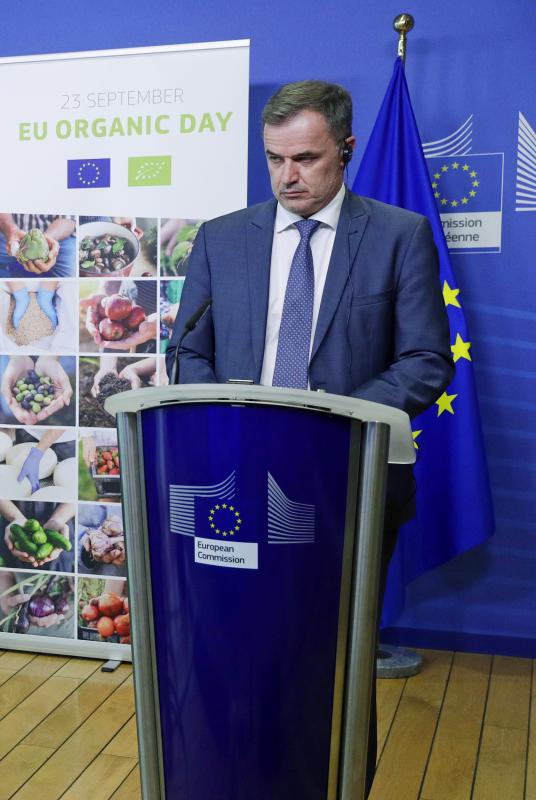A group of 41 EU lawmakers on Tuesday condemned China for its political and economic coercion of Lithuania, and called on leaders of the bloc to demonstrate solidarity with Vilnius.
The letter was initiated by Slovakian Member of the European Parliament (MEP) Miriam Lexmann, who is cochair of the Inter-Parliamentary Alliance on China.
“We, the undersigned members of the European Parliament, resolutely condemn political and economic coercion of the People’s Republic of China’s (PRC) against Lithuania,” the letter said.

Photo taken from Miriam Lexmann’s Twitter account
The letter addressed European Council President Charles Michel, European Commission President Ursula von der Leyen, High Representative of the EU for Foreign Affairs and Security Policy Josep Borrell and two other officials.
“The aggressive rhetoric of PRC officials, as well as the unexplained and undeclared measures which de facto constitute sanctions that ban Lithuanian-made products and those from other countries with Lithuanian components from entering the Chinese market are deplorable,” the letter said.
“Such unlegislated actions and practices violate not only all international and WTO rules of trade, but also directly impact underlying principles of the EU single market, and that is why they must be addressed by the European Union jointly,” it said.

Photo: EPA-EFE
“We refuse any form of pressure and condemn threats regarding the independent right of countries to develop relationships with Taiwan in line with their national interests and shared values of democracy and human rights without foreign interference,” the lawmakers wrote.
They said that “failing to respond to the PRC’s actions would embolden it to engage in further coercion against Lithuania or any other EU member states in the future.”
They welcomed joint statements of solidarity with Lithuania by US Secretary of State Antony Blinken and German Minister of Foreign Affairs Annalena Baerbock, while urging EU institutions to take stronger action.
“We urge EU institutions to follow suit and to take bold leadership in defending basic principles of the single market against the PRC intimidation. We cannot allow the PRC to undermine the EU’s basic values and principles,” the letter said.
The letter was also signed by German MEPs Reinhard Butikofer, Engin Eroglu and Helmut Geuking; Belgian MEPs Benoit Lutgen and Johan van Overtveldt; and other lawmakers.
In Taipei, the Ministry of Foreign Affairs thanked the European lawmakers for backing Taiwan-Lithuania relations.
The signatories were MEPs from 18 EU member states and five major caucuses, showing that countering pressure from China has become an international and cross-party consensus in Europe, the ministry said in a statement.
The ministry appeals to like-minded partners across the world to support Lithuania with concrete actions, which is to maintain supply-chain security, as well as a free and democratic market economy, it said.
Separately, Estonian Minister of Foreign Affairs Eva-Maria Liimets on Monday also voiced her country’s solidarity with Lithuania.
Estonian Public Broadcasting on Tuesday reported that Liimets made the comment during a teleconference with Chinese Minister of Foreign Affairs Wang Yi (王毅).
The virtual meeting was convened to discuss the UN Security Council — of which Estonia had been a non-permanent member until December last year — and cybersecurity and human rights, the broadcaster said.
Estonia stands with Lithuania in its recent dispute with Beijing and considers human rights a fundamental issue where no compromise can be made, Liimets was cited as saying.
Additional reporting by Jonathan Chin

Auckland rang in 2026 with a downtown fireworks display launched from New Zealand’s tallest structure, Sky Tower, making it the first major city to greet the new year at a celebration dampened by rain, while crowds in Taipei braved the elements to watch Taipei 101’s display. South Pacific countries are the first to bid farewell to 2025. Clocks struck midnight in Auckland, with a population of 1.7 million, 18 hours before the famous ball was to drop in New York’s Times Square. The five-minute display involved 3,500 fireworks launched from the 240m Sky Tower. Smaller community events were canceled across New Zealand’s

The Ministry of Foreign Affairs (MOFA) yesterday said it is closely monitoring developments in Venezuela, and would continue to cooperate with democratic allies and work together for regional and global security, stability, and prosperity. The remarks came after the US on Saturday launched a series of airstrikes in Venezuela and kidnapped Venezuelan President Nicolas Maduro, who was later flown to New York along with his wife. The pair face US charges related to drug trafficking and alleged cooperation with gangs designated as terrorist organizations. Maduro has denied the allegations. The ministry said that it is closely monitoring the political and economic situation

UNRELENTING: China attempted cyberattacks on Taiwan’s critical infrastructure 2.63 million times per day last year, up from 1.23 million in 2023, the NSB said China’s cyberarmy has long engaged in cyberattacks against Taiwan’s critical infrastructure, employing diverse and evolving tactics, the National Security Bureau (NSB) said yesterday, adding that cyberattacks on critical energy infrastructure last year increased 10-fold compared with the previous year. The NSB yesterday released a report titled Analysis on China’s Cyber Threats to Taiwan’s Critical Infrastructure in 2025, outlining the number of cyberattacks, major tactics and hacker groups. Taiwan’s national intelligence community identified a large number of cybersecurity incidents last year, the bureau said in a statement. China’s cyberarmy last year launched an average of 2.63 million intrusion attempts per day targeting Taiwan’s critical

‘SLICING METHOD’: In the event of a blockade, the China Coast Guard would intercept Taiwanese ships while its navy would seek to deter foreign intervention China’s military drills around Taiwan this week signaled potential strategies to cut the nation off from energy supplies and foreign military assistance, a US think tank report said. The Chinese People’s Liberation Army (PLA) conducted what it called “Justice Mission 2025” exercises from Monday to Tuesday in five maritime zones and airspace around Taiwan, calling them a warning to “Taiwanese independence” forces. In a report released on Wednesday, the Institute for the Study of War said the exercises effectively simulated blocking shipping routes to major port cities, including Kaohsiung, Keelung and Hualien. Taiwan would be highly vulnerable under such a blockade, because it